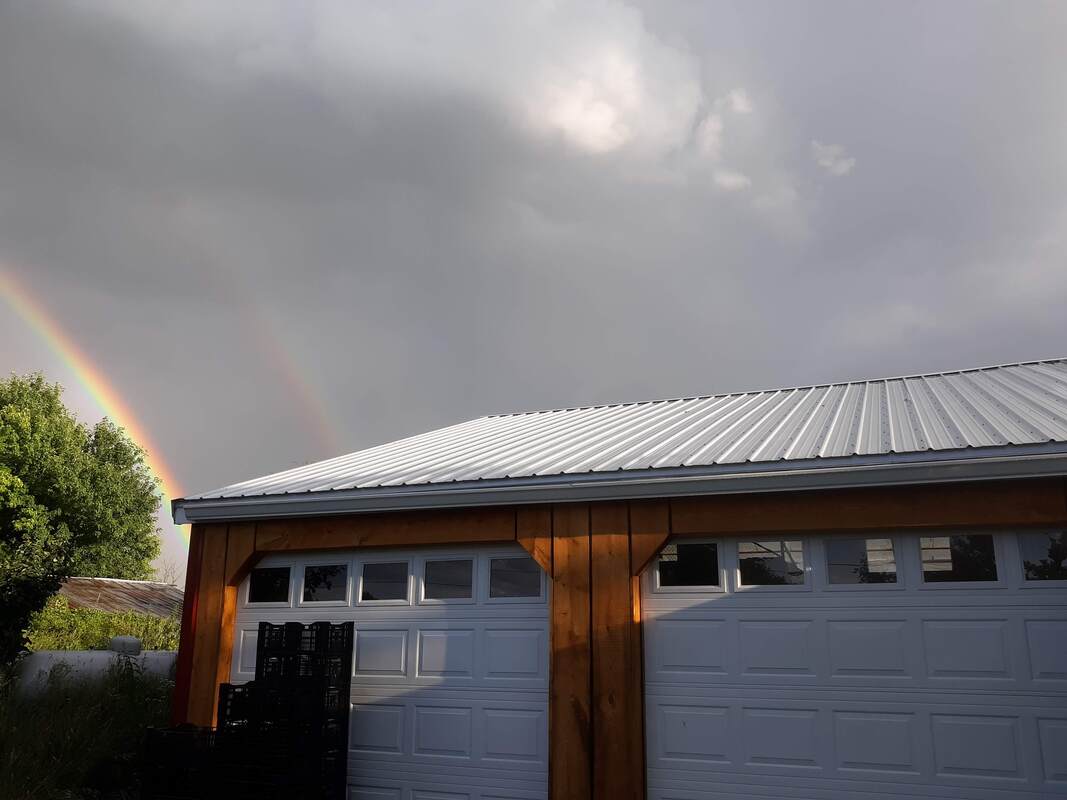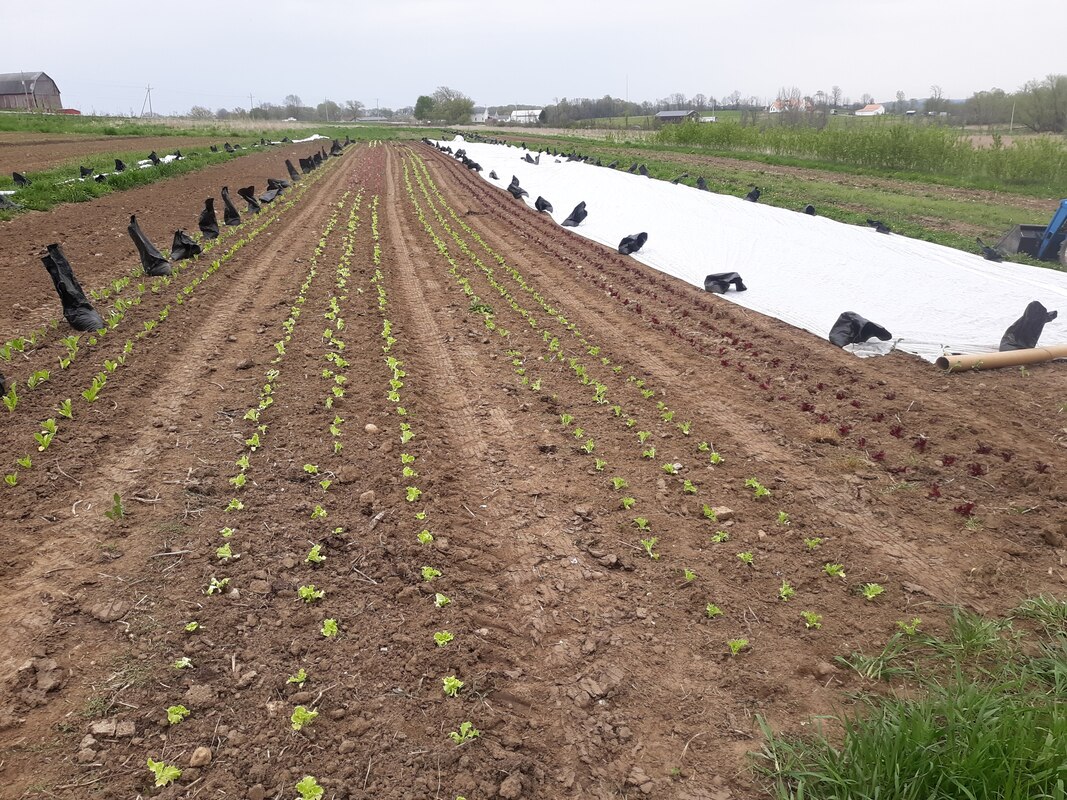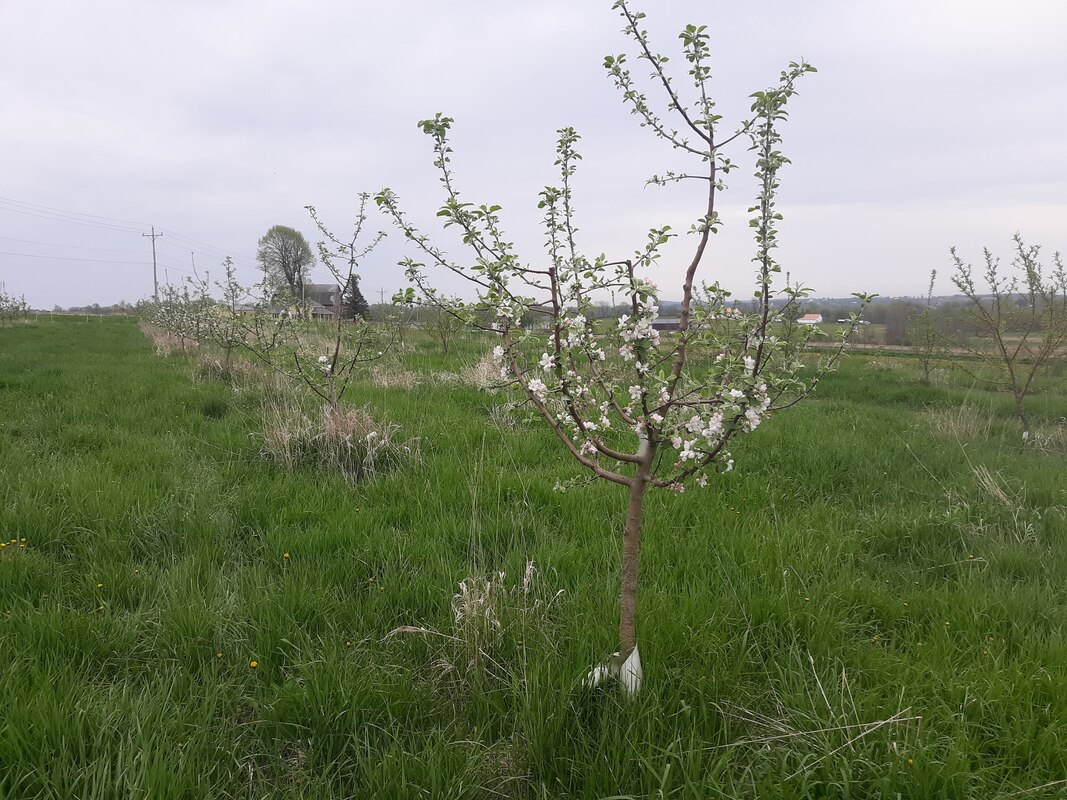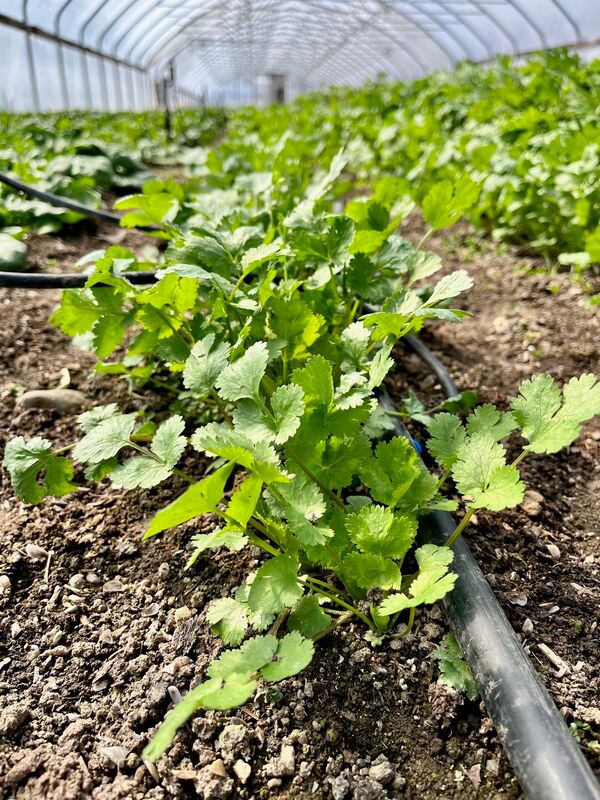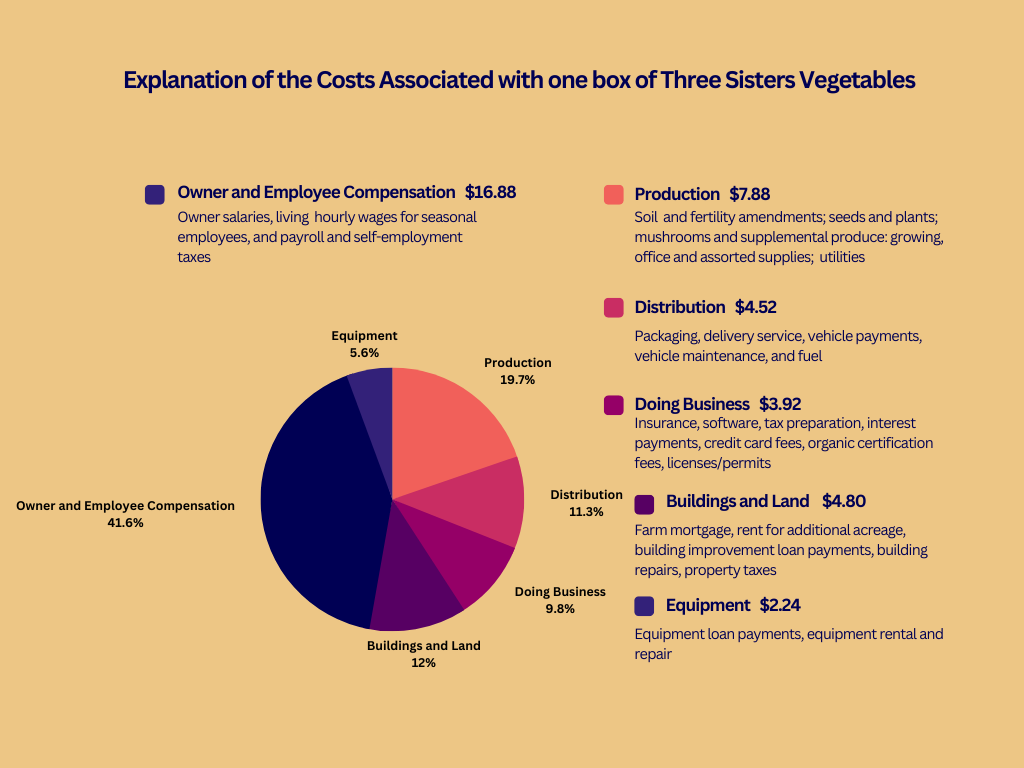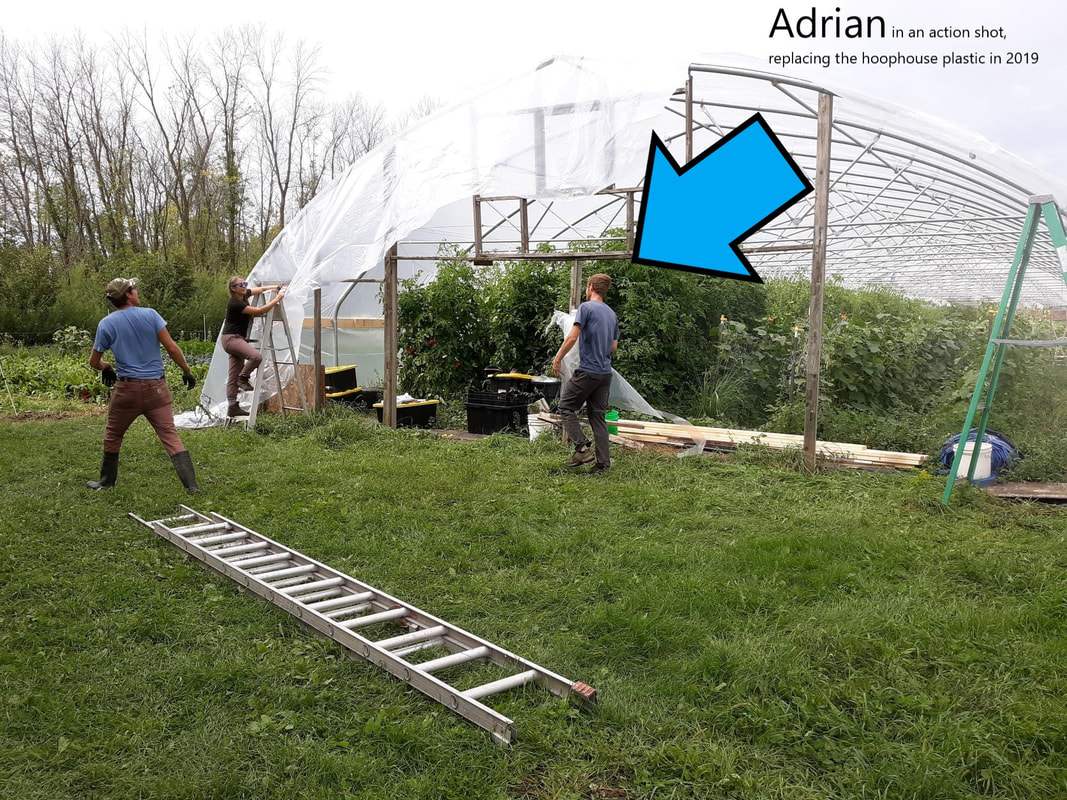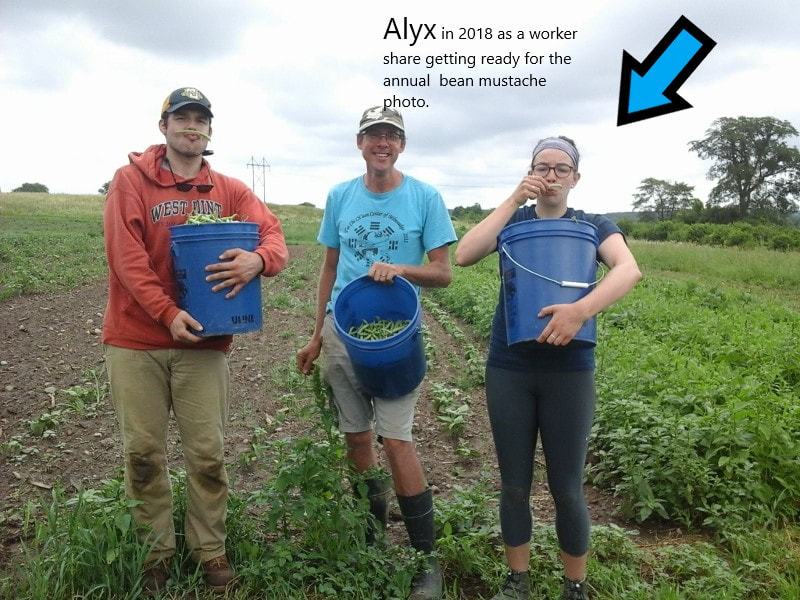|
Warm end-of-year greetings from your farmers at Three Sisters Community Farm! We (Kelly and Jeff) are writing from the Southwest where we’re squeezing in a quick family holiday. Still, we find ourselves excitedly thinking about and planning for the coming farming season, which will be Three Sisters Farm’s 14th.
We’re always trying to improve here at Three Sisters – always trying to find better ways to care for the earth and to get more nourishing and fresher food to you, our members. Part of our winter work as farmers is to review the season just completed and to research new methods, equipment and ideas to keep moving forward. But 2023… whew! Here are a few brief highlights: An epic drought that had us a bit stressed for a big chunk of the season. Glad that’s over! Despite the drought, the irrigation kept working and the veggies kept coming. Some crops did as well as they ever had for us. For example: We harvested nearly 700 lbs. of peas (!) to distribute over the course of 3 weeks. A big thank you to the many volunteer pea pickers! Green beans (another labor intensive crop to pick): Starting in Week 8 we offered beans for 7 weeks, which is quite a run. Somewhat mysteriously to us, the broccoli had an epic year in 2023: Starting in Week 4 (June 29) we harvested and offered broccoli every week of the CSA, even offering it for our first Fall Share on 10/26. Kelly kept the cucumbers coming this season – from Weeks 5 to 14. Even more amazing is that she picked most of these herself! The summer squash had a similar run. The allium family loves the dry heat. 2023 was our biggest onion and garlic year ever. And we were able to offer scallions every week of the season. For this overabundant crop, and some others, a unique program called the Wisconsin Local Food Purchase Assistance Program (WILFPA) allowed us to contribute excess veggies to those who need them while covering our costs for harvest and delivery. We contributed over $6000 in produce in 2023. Unfortunately we weren’t accepted for the 2024 program, but are working on ways we can continue doing the same thing going forward. Each year a few crops underperform – it’s inevitable when you grow so many. We’d hoped to have more fall greens like spinach; it prefers cool and moist conditions to germinate well. And we hope to improve our winter squash harvest in 2024. The yields weren’t bad (especially considering how the plants looked in the drought) but we’d like to find some new, more exciting varieties going forward. If you have any ideas – about squash or any other crops – let us know! Much else was exciting about 2023. The heirloom wheat project continues to grow in scope and scale – we harvested at least 1000 lbs. this fall. And we continue to work with Wellness Found in Slinger – they have been making an excellent sauerkraut with our cabbage that we offer with the shares. Perhaps the most exciting news though, is that many of our 500 or so orchard trees (that we planted in 2019) are just starting to bear fruit. This fall we consulted with Chris McGuire of Two Onion Farm near Plattville. He is a former veggie CSA farmer now farming apples organically – not an easy task in the midwest. Chris helped us develop a management strategy so that we can begin offering quality, edible organic apples – and pears, plums and peaches – to you soon. How soon? Good question. While there may be a few things trickling in in 2024, we’re thinking probably 2025 is a safer bet. This coming year however, we want to begin convening a small group of people who – almost like our normal veggie worker share members – want to help make the orchard a success through help with orchard tasks like pruning, thinning and harvesting. We’re very excited about this new phase in Three Sisters development, and look forward to sharing more information in the new year. Here’s to a happy and healthy 2024!
2 Comments
I am writing out the final checks to our community loan promissory note holders who took a chance to support a shared vision for the future of Three Sisters Community Farm in 2018. Five years later we met our goal. We have the infrastructure in place and the supporting social structures to grow and distribute food from March to December.
We raised $28,000 from our members in 2018. We were optimistic that this amount would do the trick. Those funds however, ran out in 2019 and we hadn’t yet come close to getting our infrastructure where it needed to be. A rough estimate is that since 2020 we have invested an additional $195,000 in the business infrastructure and support structures to get us to a stable place with everything we need to do our work. The funds were pieced together with loans, grants, donations, business revenue and private investor funds. So we finally achieved our goal. This was the first year that we were able to focus most of our energy on growing food. There were no major infrastructure projects hanging over our heads. It feels odd. Have you ever worked so hard to reach a goal and then, when you arrive, it’s like “Now what?” How do you stay inspired to keep up with the never ending demands of what you have created? January and February are important months for us to gather strength and imagine the future. What are questions that remain for us? It is the nature of things that they change constantly and one has to tune into the changes in order to keep pace with what is working towards us from the future. Questions we hold that may shape some of our work in the future are: What is the role of culture and cultural activities on the farm? Who will continue to want to do this work, and how will they be fairly compensated? How can we work collaboratively with others? What will we do with 500 maturing fruit trees? How will we continue to increase soil health and biodiversity? What will happen to the land we currently manage beyond our tenure? How will we keep pace with the physical and financial demands of maintaining our land base and buildings? Thanks for being a part of this, Kelly The fields: The week started with quite a bit more rain that was forecasted which helped the weeds in the new plantings germinate and the cover crops and vegetation in the drive lanes grow like crazy. Once weeding and mowing tasks are added to the docket, as they have been this week, we say goodbye to being on top of everything that needs to be done. We were able to finish planting the onions and shallots and were able to squeeze in an extra bed of shallots for a total of 11,000 plants. It was still pretty wet in the fields, but by Tuesday afternoon we were able to drive the tractor in the field to transplant with the crew. We wanted to take advantage of the fact that the soil was wet because our well still wasn’t up and running due to more delays from We Energies, so we were not able to put water in our water wheel transplanter or water in the seedlings with the sprinklers. By the end of the day on Thursday we were finally able to get all of our first succession of broccoli, kohlrabi, kale, swiss chard, cabbage, scallions, lettuce, fennel, and leeks planted. We cover the broccoli, kale, kohlrabi and cabbage with a woven fabric that is secured with sandbags because if we don’t there is a little beetle called a flea beetle that shows up in the spring that really likes these crops and will decimate them in one day. The downside of the fabric is that it has to be removed to weed the plants, and since it traps warmth and moisture-the weeds germinate and grow abundantly under this fabric. By the end of the week we already had to take the fabric off to weed the cabbage and broccoli. The peas finally came up and they look great. We planted 5 250’ rows this year…2 more rows than last year! Clark and Kelly had fun pounding in oak stakes every five feet in row for the pea trellis. We did a lot of wheel hoeing of our first direct seeded crops and the garlic. The wheel hoe is exactly what it sounds like…a hoe with two handles and a wheel that we push along in row to uproot weeds. The bees came this week and Anna installed them into their hives. One of the queens didn’t make it and so she had to troubleshoot that problem. In 2019 we planted 500 semi-dwarf fruit trees. Jeff and I along with our friends Ken, Adrian, Joseph and Cory have volunteered our time to care for the trees. The trees are blooming this week which is a welcome sight. Right now the trees bring nothing but delight. We were in the running this spring for a grant from the Fronterra Farmer Foundation, that we were hoping to receive to help us upgrade to a newer tractor. We recently found out that while we had a strong application our grant was not awarded. So we had to find a different path to make this a reality. This week with the help of our amazing loan officer at the Farm Service Agency we secured financing. Now we just have to find the right tractor at the right price! And finally, the well saga finally came to a close! We Energies finally completed our electrical installation. However, when we tried to fire up the well on Tuesday night we were dismayed to find that nothing happened. I’m usually pretty optimistic, but this was a heavy blow. We NEED that well to operate our business effectively. We called up the electrician who installed the meter pedestal. He graciously came out after his shift that very night. After receiving such poor customer service from We Energies it meant a lot that the electrician went out of his way, coming after hours. At first he told us that he figured out the problem and could solve it. I actually cried a little bit because I was so happy. After two hours and a couple of smokes, he tried his best to figure out what was wrong with the wiring but thought that the problem was with the well components. We had already experience a 8 month delay because of the unavailability of necessary parts-so this put me on edge. The next morning we called the well drillers who put the well and pump system in for us in the spring of 2019. Paul, one of the drillers and a man who probably could have retired 10 years ago, showed up that afternoon with grease up to his elbows and dried concrete on his arms from whatever he was doing earlier that day. His hearing aids are visible, and I imagine he lost his hearing from working on a well rig that drills through hundreds of feet of bedrock. In the back of my mind I’m bracing myself for the worse-case-scenario that he will need a part that isn’t available. I want to watch him work because he is my last hope for getting this well up and running. But I become aware of the fact that he’s opening a really complicated box of electrical wires and I figure he just needs to focus so I go back to wheel hoeing, but not before I get the sense that there is nothing wrong with the well, but that he is dismayed at the wiring job the electrician who installed the pedestal did-which to him was obviously incorrect and the reason the well was not working. So within an hour he was able to fix the wiring and get the well working for us–for just $160. To me Paul is a hero. He is honest, hard working and knows how to do really important, dangerous and complicated things. His red work truck says “24 hour service” and I know it's true! The hi-tunnels: This week we planted the warm weather crops-eggplant, tomatoes and cucumbers. The hi-tunnels are officially completely planted. We also gave the carrots and beets their second hand weeding. The seedling greenhouse: We start peppers and tomatoes in open flats so that we can germinate them on a heat mat. They don’t germinate well unless the temperatures are at least 80 degrees. This week, the plants were all up and Renee used a butter knife to pry up each individual plant and transfer it into trays with individual cells to give the plants more growing space. We started about 3,000 pepper plants and several hundred canning tomatoes and cherry tomato plants for the fields. Usually the greenhouse is packed full, but we got so many plants in the ground this week that there is actually some extra space, at least until next week when we start our 3rd big succession of plants and microgreens. The packing area: On Tuesday the Wisconsin Food Hub came to the farm and picked up 1020 pounds of carrots and delivered them on Thursday for us to Feeding America. -Kelly We think 2023 is going to be a great year on the farm! Whether you are brand new to the farm or have been a member for a long time there will be much to look forward to. This year we are trying out two new crops: broccolini and truss tomatoes. We are planning to begin deliveries in the beginning of June and we will send out more detailed specifics about everything you need to know as the first delivery approaches. We met our membership goal in early March, but we are still accepting worker shares. If you know anyone interested in working at the farm to pay for their veggies, have them contact Alyx, the farm volunteer coordinator at [email protected] for more information.
We’ve been picking up the pace here and the work days are starting to get longer. We’ve filled the greenhouse with seedlings, prepped and planted in the hi-tunnels and last week we were able to spread lots of compost and prep outdoor fields for planting. We even seeded some crops (peas, carrots, beets, spinach, cilantro, and assorted greens) hoping that the rain and snow will help the seeds sprout. The garlic, which overwinters, is up and looks great, and the trees started to leaf out last week. We are keeping the transplants in the greenhouse until the long-range forecast looks more stable. The first transplants that go in every year are the onions. We are super duper excited that staff member, Anna, has decided to put the farm's old beekeeping equipment to use this year. It gave us the impetus to sort through all the boxes. Anna will be installing two packages of bees in early May at the farm. We have been in the process of converting the well at our rental property from running off a generator to running on electricity from the grid -- a process that we began in the fall of 2021 and has been subject to Murphy’s Law since its inception! It is taking much longer than anticipated for a number of reasons, but we received confirmation this week that the installation will be done by May 6th. For us, this is something to celebrate, especially since last fall the well was wired so that it can no longer run off a generator. There have been so many delays that we know not to celebrate until we have running water. We’ve been farming long enough to know that it’s not a good idea to grow vegetables unless you have a way to water them when needed. This year we are putting more energy into making the food we grow available to people who wouldn’t be able to afford purchasing it. In addition to our share a share program which many of you generously contributed to that makes funds available to support the purchase of CSA shares for families who might not be able to otherwise afford it, this past week we received a $5,000 grant from the Wisconsin Local Food Purchase Assistance Program. This grant will reimburse our farm for donations that we make to food pantries of tomatoes, cabbage, kale, chard, scallions, summer squash, and carrots. We had already set a goal to donate $4,000 worth of assorted produce, so now our goal is set around $10,000. Historically, almost all the veggies we deliver to members in June come out of our hi-tunnels. Kelly, who manages the hi-tunnels is always relieved when we can plant in the fields by mid-April because if crops do well in the fields early it can supplement the offerings and make for a stronger start to the season. We felt that the soil temperatures were high enough last week to take a chance seeding in the fields-even though snow was in the forecast. It will be a while before seeds germinate and we can see if our efforts were worth it. Spring can be hit or miss with field plantings because of unpredictable weather. We have been known to lose entire plantings in the fields this time of year overnight which can be disappointing. We try not to dwell for too long on the losses and instead focus on how we can adjust our planting schedule moving forward to make sure we are able to have a variety of harvestable crops each week. -Kelly If you haven't seen next week's forecast yet...you might want to take a look. Its going to feel like summer! This is very exciting, but also confusing for our mental state as farmers. We will have to remind ourselves that it is still spring and we are not behind in our planting schedule.
We are coming out of a winter where there was not much frost in the ground and so far this year there has been much more precipitation than the last two springs. The MKE riverbed near the farm is flooded and our lower soils are fairly saturated. We have appreciated the mild thunderstorms, which we didn't have much of the last couple of years. As long as there is moisture in the soil, lightening is great for plant growth. So far this spring we have been working exclusively in the hi-tunnels. With warm, dry weather on the way next week, we are optimistic that we will be able to begin working the soil outdoors. Spring requires farmers to be flexible and adaptive. There have been years when we have been able to plant in early March and other years that we haven't been able to plant outdoors until May. We appreciate when we are able to begin working outdoors in April because if we have to wait until May, the tasks have really built up and we have to work extra hard to catch up. Spring Share Forecast-What to expect: Microgreens grew faster and are more abundant for the upcoming share than the last. Spinach is tender but has large leaves. It has a delicate flavor and is great for throwing in almost any dish. Cilantro is abundant and tasty-this may be the only share it is offered for. The kale has grown-it is from the same planting as last share, but the leaves are larger. Arugula will be a modest serving and has small leaves as of today, but we anticipate they will size up a bit before next week. This will be the last share onions and cabbage are available. We should have carrots, potatoes, beets and mushrooms for the last share at the end of April. As of right now it is looking like we should have the following fresh stuff for the last share: radishes, spinach, lettuce mix, pac choi, green garlic, and mustard greens. Thank you so much for joining us for our the spring season. First shares will be delivered Thursday, 3/16. I will be sending out more details next week to make sure you feel confident finding your pick up location.
We are so glad you found Three Sisters Community Farm. Eating fresh from our farm is a wonderful gift that you have given yourself. We started Three Sisters Community Farm in 2011 because we realized that in order to find the highest quality and safest foods we needed to grow them ourselves. Many of the veggies in this weeks share have been in cold storage for the last 3 months. When you receive them, they will keep best in your refrigerator. This is because, taking them out of cold storage at this point will trigger them to begin growing and they will very quickly sprout which pulls energy out of the root. We are glad to be able to offer fresh over-wintered spinach from our hi-tunnel. We have limited this to one per customer with the following reasoning: each member has the ability to select one bag...we harvest everything that is available and divide it equally. Doing it this way ensures each person gets the maximum amount of spinach and that we use use the minimum number of plastic bags. Here is what the spring season forecast: We anticipate that the carrots, potatoes, beets, fresh spinach and mushrooms will be available for all 4 shares. We have a lot of onions and cabbage but will have to watch the quality on these-we expect that they will be in good shape for at least the first two deliveries. Once these have run out we will add shallots-which tend to store forever-into the lineup. We were bummed to discover that our storage space got too cold for our winter squash--and as a result it didn't keep. We hope to add additional fresh items from hi-tunnel and greenhouse production for the remaining 3 shares such as microgreens, baby kale, cilantro, lettuce mix, arugula, radishes and a few other surprises. We are a community farm which means that your food is grown, harvested and packed by a large group of people with more or less skill depending on the day. YOU are invited to the farm to experience first hand everything that goes into growing the produce in your box. That being said, if something doesn't seem quite right with an item you received in your box...reach out and let us know-it may have slipped past our quality control. -Kelly We are so close to launching the 2023 season, and so honored that we have your support to make our work possible for another year. At the heart of CSA is the idea that when a farm is economically stable because a group of consumers has chosen to support it in exchange for a share of the harvest, the stress on the farmer is greatly reduced and they are able to focus on producing a higher quality of product in a way that minimizes compromises to the care of the earth -- compromises that are often forced on farmers from the pressure of trying to stay in business while producing food for the open market. In order for consumers to feel confident supporting the farmers, a high level of transparency is necessary. The farmers have a responsibility to ensure their work remains efficient and competitive. Originally the pioneers of the CSA movement envisioned that the process of setting budgets, pricing and risk and reward agreements would be carried out jointly with consumers and farmers at the table. We have found that the best method for us has been to put forth what we are capable of, be transparent about it and accept feedback in the form of customer surveys, customer retention rates and direct and open conversations throughout the year with our customers who we see on delivery routes or who come out to help at the farm. All that being said, we'd like to present you with a breakdown of all the costs associated with the production of one CSA box so that you have a clear idea of what you are agreeing to support when you sign up for a CSA share. We hope to open sign up on Monday! -Kelly To read more in depth about CSA check out the following: Lorand, Andrew. "CSA." Dr. Lorand's Professional Biodynamics. https://drlorand.wordpress.com/csa/
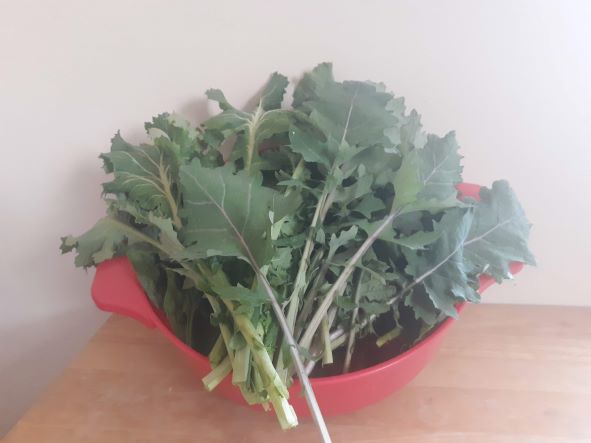 As I sit down to write for the second spring share, I look out my window at the second heavy snow fall of the week. What a different spring this is from last year. Last year we were already able to work the soil in our outdoor fields in Mid-March, and by then abnormally dry conditions had already set in-conditions that have only recently started to turn around. We are glad for more precipitation, especially in the spring. Last year just felt strange--AND there were no morel mushrooms to be found! This year feels a little more normal, but we are indeed antsy to get into the fields to start planting for the regular season. Because every year is so different, we have learned that you can't really count on anything! What does well one season may be a total bust the next year. So far that has proven to be true this year. Last year we were loading boxes with spinach that over-wintered in our outdoor fields under a temporary miniature version of a greenhouse. This year we have been unable to harvest that planting and so we are glad that we diversified with a planting in our hi-tunnel of both spinach and kale for spring shares. Growing greens this time of year without supplemental heat and light feels a bit like wizardry. Nothing else outside has even greened up yet and the trees are still without leaves. The days to maturity dates in seed catalogues which are supposed to tell you how long a crop takes from seeding to harvest don't mean a thing. For example kale mix is supposed to take 30 days from planting to harvest. Well it was seeded last October and we are just harvesting it now, so that is actually 147 days! This kale, seeded last October, made it through the winter miniature in size which means that it remained that size for about 100 days. Since the last share on March 24th, it has tripled in size-so much so that we will offer it as bunched kale for the coming share. Sincerely, Kelly Part III
Make a Donation Imagine 30 two-hundred-foot-long rows of onions planted 6 inches apart. These onions will supply Three Sister's 250 CSA members with onions for several months each year. Transplanted in April, by June they have already been weeded with a tractor and hoed at least once. Now the plants have grown too big for these tools to be used, but a new flush of weeds is threatening to overtake the entire crop. Something needs to be done or the weeds will outpace the crop and the onions will be stunted and lost in a forest of weeds come harvest time in August. These onions need to be hand-weeded; a task that would theoretically take one farmer 40 hours to complete. It is however unlikely that any one farmer would be able to complete this task; there’s too much else to do at the same time, and one’s physical body or mental health would likely give out before the task was complete. At Three Sisters Community Farm we have always taken a community-oriented approach to solving the problem of a burdensome workload. When 13 people show up on a Saturday morning – like they did this year -- weeding the onions only takes 3 hours, and no one leaves feeling physically or mentally exhausted. In fact, the work seems almost effortless. During such sessions, members and farmers can get to know each other and share stories and ideas that lead to the further development of the farm community. And it’s fun! Hand weeding onions is just one example of a long list of epic tasks that present themselves one-after-another each growing season on a diversified organic vegetable farm. Each year the work of feeding 250 families/friends is made possible by a small core of employees and contractors and a much larger army of volunteers. On any given week there are between 15-45 people helping out with harvest, field work. packing boxes or overseeing our pickup locations. That is ALOT of people! We are so thankful for this crew. We believe that people power allows us to produce a much higher quality product than the industrial food system, not only because things are done by hand but also because they are done with heart. We are excited to announce that next year we will place even more emphasis on our volunteer program. Alyx -- who has been both a worker share volunteer and employee at the farm -- will step into the role of volunteer/social coordinator. In this capacity, she’ll help us streamline and grow our volunteer program as well as provide new and fun opportunities that will serve members of all ages. This is a role that needs more attention than we have been able to manage, and Alyx has the skills to take this aspect of Three Sisters to the next level. In order to take this leap we are asking for your help. We know that the benefit of this program to the farm will sustain its cost in the future; it is during the initial phase of its development that we ask for your support. If you have ever been positively impacted by your time as a volunteer or benefitted from the work of a farm volunteer we ask that you consider a gift to help support the salary of the volunteer coordinator position at Three Sisters Community Farm as well as the procurement of additional tools, signs, infrastructure, advertising/outreach that will help make this initiative a success. How will these needs be met? (Part Two)
After ramping up our infrastructure over the past three years, we’re now ready to bring on some co-workers to help move Three Sisters forward. Last winter, after crunching some numbers and honing a vision of the next four years that includes some modest growth (view our 4 year financial projections here) we realized some financial assistance would be helpful to support the creation of the new salaried positions we identified as integral to this next phase. We learned we were prime candidates for a USDA Rural Development grant program that focuses on supporting the creation of jobs in agriculture, and also learned that our chances of receiving an award were good due to an influx of Covid-19 relief funds into the available pool. All that was needed was the commitment of time and energy to complete the application. During the months of February, March, April and May this year Kelly felt as if she was forging the future of Three Sisters in a bureaucratic crucible. In the end the grant ate up at least 100 hours of precious down-season and planning time, and was over 100 pages of essays, cash flow projections, financial statements, job descriptions and supporting documentation. Finishing the grant would not have been possible without the help of several friends, notably Angie, Sarah and Stephanie. We found out in August that the grant was funded! This gives us some additional confidence to step toward a new future. Starting in 2022 the farm will bring on two co-workers, Adrian and Alyx. We have worked with both these fine individuals in the past. The USDA grant will cover half of the salary of one full-time person for a year for their role helping Jeff in our vegetable pack shed. Adrian brings his experience and expertise to the production side of the farm, and to the development of our fruit orchard. The talented Alyx we see wearing many hats: serving as member liaison and helping with farmwork and packing. Also, we’re excited for her to wield her considerable people skills as the farm’s social coordinator – think more volunteer opportunities, more on-farm events. It’s for this aspect of Alyx’s role that we will soon launch a crowd-funded campaign. We are stepping into a new era at Three Sisters! We are thankful for any support you have showed us so far and we hope you will continue to be a part of the journey. |
